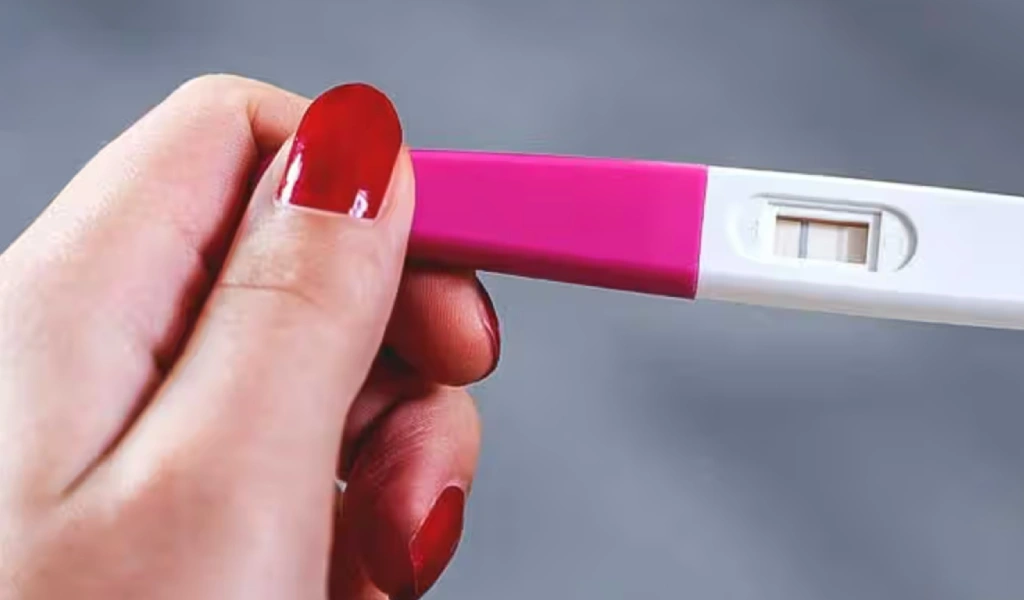HCG Blood Pregnancy Test can identify the existence of the HCG hormone (which is discharged after implantation) and provides reliable precision.
Human chorionic gonadotropin (hCG), which is mainly produced by the placenta, is used in blood and urine tests to determine pregnancy. The hCG blood pregnancy test can confirm pregnancy before your missed period by detecting hCG levels in the blood as early as six days after embryo implantation.
The peak concentrations of hCG usually occur during the initial 14 to 16 weeks following your most recent menstrual period. Following this period, the levels gradually decrease but stay consistent throughout the pregnancy.1
Continue reading the article ‘How Does the HCG Blood Pregnancy Test Work?‘ for comprehensive information regarding the hCG blood pregnancy test, including the recommended timing for taking the test, understanding the results, and its level of accuracy.
What does the hCG blood pregnancy test entail?
HCG blood pregnancy tests are utilized to identify the presence of the hCG hormone in the bloodstream to precisely confirm pregnancy. These tests need to be done at a healthcare facility.

There are two categories of hCG blood pregnancy tests that you may need to know.
- The qualitative hCG test is used to detect the presence of hCG in the blood and provides a result of either positive or negative.2
- Quantitative hCG testing involves measuring the levels of hCG in the bloodstream to determine the precise age of the fetus during pregnancy and to detect potential complications like miscarriage or ectopic pregnancy. It is also beneficial for monitoring individuals with molar pregnancies and Gestational Trophoblastic Disease (GTD).3
Other names for a quantitative hCG blood test are commonly used, such as:
- Beta hCG blood test is performed.
- A repeat quantitative beta-hCG test is conducted.
- A quantitative serial beta-hCG test is carried out.
- A quantitative blood pregnancy test is done.
When can a quantitative hCG test accurately detect pregnancy?
A pregnancy in its early stages can be identified with the help of an hCG blood test within six to eight days after the embryo is implanted.4

This indicates that the test can find out about the pregnancy around ten days to a week before the anticipated date of the next period.5
How precise is the hCG blood test for detecting pregnancy?
HCG Blood pregnancy tests are typically accurate to about 99%. In some rare instances, HCG blood pregnancy tests may provide incorrect results, either showing false positives or false negatives. Only a small amount of blood is needed to determine the levels of the hCG hormone.

Compared to urine pregnancy tests, blood tests for hCG are considered more dependable because they can detect even minimal levels of the hormone, allowing for earlier detection of pregnancy.6
Possible factors that may impact the results of the hCG blood test include7
- Certain medications, especially fertility drugs and injections, have the potential to impact fertility.
- The presence of specific tumors such as germ cell tumors, molar pregnancy, and gestational trophoblastic disease can also influence fertility.
- The fertility of an individual can be affected by carrying multiple babies, such as twins or triplets.
- Additionally, experiencing a recent miscarriage can contribute to fertility problems.
What is the purpose of getting an hCG blood test?
The following are the typical reasons for conducting an hCG blood test.7
- Identifying pregnancy is necessary
- Estimating the age of the fetus
- Diagnosing abnormal pregnancies like molar and ectopic pregnancies
- Identifying potential miscarriages
- Conducting screening tests for Down syndrome
- Diagnosing abnormal conditions in non-pregnant individuals, such as ovarian tumors.
Why else would someone undergo a beta hCG blood test?
HCG is recognized as a tumor marker due to its presence in certain cancer types. The circumstances under which the hCG hormone is expected to be found include.
- Ovarian and uterine cancers
- Trophoblastic tumors
- Hydatidiform mole
- Testicular cancer affects men
Elevated levels of hCG have been observed in cases of lung, liver, stomach, and pancreatic cancers.
How is the b-hCG test conducted?
The exam is comparable to a standard blood test, involving the collection of a small sample of blood from a vein in the arm through venipuncture. No specific preparations are needed.
It is recommended to disclose any medications, herbal remedies, dietary supplements, or homeopathic medicines you are currently taking to your doctor as they could impact the test results.
The examination requires the subsequent procedures.
- A skilled phlebotomist collects blood samples and uses an elastic band on the upper arm to make veins more visible.
- Before starting the procedure, the area surrounding the visible vein is cleaned with an antiseptic solution.
- Carefully, a needle is inserted into the vein to collect a blood sample into a vial.
- The rubber band and needle are taken out.
- The area is wrapped with a cotton gauze or bandage to prevent further bleeding.
- The blood sample is forwarded to the lab for examination.
Are there any risks associated with taking an hCG blood pregnancy test?
An hCG blood pregnancy test is unlikely to pose any significant risks. The side effects are typically transient. A few of them include.
- Discomfort or a burning feeling where the puncture was made
- Feeling dizzy

- Blood collecting under the skin (bruising)
- Possibility of infection if there is a break in the skin.
How can hCG blood pregnancy test results be interpreted?
In a qualitative beta hCG test
- Getting a positive outcome means you are currently or were recently pregnant.8
- Obtaining a negative outcome means you are not pregnant or the test was done too soon.
In a quantitative beta hCG test
The outcome is presented as a numerical value (in milli-international units per milliliter – mIU/mL) which represents the amount of hCG hormone present in the bloodstream. The concentrations increase quickly in the initial three months of pregnancy, then decrease and stabilize for the duration. The levels can differ depending on how far along you are in your pregnancy. Your healthcare provider can clarify the significance of the specific levels for your pregnancy.9
In a woman who is not pregnant, the levels would be lower than 3mIU/mL.10
A hCG level that is above the standard range could indicate any of the following possibilities.
- Various instances of being pregnant with more than one fetus, like twins or triplets
- Uterine choriocarcinoma
- Hydatidiform mole or molar pregnancy
- Cancer of the ovaries
A lower hCG level than the normal range may mean any of the following.
- Incomplete miscarriage
- Fetal death
- Ectopic pregnancy
Results of hCG blood tests: Inaccurate positive results and inaccurate negative results
False results may be obtained from an hCG test, which can be similar to urine or at-home pregnancy tests.
- Getting a false-positive result on a pregnancy test means receiving a positive outcome when you are not truly pregnant. This can happen due to the intake of medications or injections containing hCG, such as those used in fertility procedures, or in cases of particular types of cancer.
- A false-negative pregnancy test occurs when the outcome is negative despite being pregnant. This can occur if the test is done too soon before there is enough hCG in the bloodstream. Certain factors like medications, smoking, and alcohol intake can also contribute to a false-negative reading.
If the initial test comes back negative but you still think you may be pregnant, the doctor might recommend repeating the test in a few days.
While the hCG urine test is popular for home pregnancy tests, the hCG blood pregnancy test is more accurate in detecting pregnancy at an earlier stage. Two types of blood tests are available: qualitative hCG tests to confirm the presence of hCG in the blood and quantitative hCG tests to determine fetal age or potential pregnancy complications.
Various factors such as fertility medications, germ cell tumors, molar pregnancy, and other variables can impact the results of an hCG blood test. If you have concerns about early pregnancy testing or have experienced a miscarriage or fetal abnormality, it is recommended to consult with a healthcare professional.
Key Takeaways of ‘How HCG Blood Pregnancy Test Works?’
- A pregnancy blood test, called an hCG test, can be done six to eight days after implantation and comes in two forms – qualitative and quantitative.
- A positive or negative outcome is produced by a qualitative test, while a quantitative test provides numerical data revealing the hCG levels in the bloodstream.
- The results could be affected by various factors like medications being taken, existing health conditions, or a recent miscarriage.




























